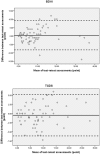Test-retest reliability and minimal detectable change of the Beck Depression Inventory and the Taiwan Geriatric Depression Scale in patients with Parkinson's disease
- PMID: 28945776
- PMCID: PMC5612646
- DOI: 10.1371/journal.pone.0184823
Test-retest reliability and minimal detectable change of the Beck Depression Inventory and the Taiwan Geriatric Depression Scale in patients with Parkinson's disease
Abstract
Background: The Beck Depression Inventory II (BDI-II) and the Taiwan Geriatric Depression Scale (TGDS) are self-report scales used for assessing depression in patients with Parkinson's disease (PD) and geriatric people. The minimal detectable change (MDC) represents the least amount of change that indicates real difference (i.e., beyond random measurement error) for a single subject. Our aim was to investigate the test-retest reliability and MDC of the BDI-II and the TGDS in people with PD.
Methods: Seventy patients were recruited from special clinics for movement disorders at a medical center. The patients' mean age was 67.7 years, and 63.0% of the patients were male. All patients were assessed with the BDI-II and the TGDS twice, 2 weeks apart. We used the intraclass correlation coefficient (ICC) to determine the reliability between test and retest. We calculated the MDC based on standard error of measurement. The MDC% was calculated (i.e., by dividing the MDC by the possible maximal score of the measure).
Results: The test-retest reliabilities of the BDI-II/TGDS were high (ICC = 0.86/0.89). The MDCs (MDC%s) of the BDI-II and TGDS were 8.7 (13.8%) and 5.4 points (18.0%), respectively. Both measures had acceptable to nearly excellent random measurement errors.
Conclusions: The test-retest reliabilities of the BDI-II and the TGDS are high. The MDCs of both measures are acceptable to nearly excellent in people with PD. These findings imply that the BDI-II and the TGDS are suitable for use in a research context and in clinical settings to detect real change in a single subject.
Conflict of interest statement
Figures
Similar articles
-
Minimal detectable change of the timed "up & go" test and the dynamic gait index in people with Parkinson disease.Phys Ther. 2011 Jan;91(1):114-21. doi: 10.2522/ptj.20090126. Epub 2010 Oct 14. Phys Ther. 2011. PMID: 20947672
-
Reliability and validity of the Beck depression inventory in patients with Parkinson's disease.Mov Disord. 2006 May;21(5):668-72. doi: 10.1002/mds.20792. Mov Disord. 2006. PMID: 16450355
-
Test-retest reliability and minimal detectable change on balance and ambulation tests, the 36-item short-form health survey, and the unified Parkinson disease rating scale in people with parkinsonism.Phys Ther. 2008 Jun;88(6):733-46. doi: 10.2522/ptj.20070214. Epub 2008 Mar 20. Phys Ther. 2008. PMID: 18356292 Clinical Trial.
-
Depression rating scales in Parkinson's disease: A critical review updating recent literature.J Affect Disord. 2015 Sep 15;184:216-24. doi: 10.1016/j.jad.2015.05.059. Epub 2015 Jun 10. J Affect Disord. 2015. PMID: 26114228 Review.
-
Measures of depression and depressive symptoms: Beck Depression Inventory-II (BDI-II), Center for Epidemiologic Studies Depression Scale (CES-D), Geriatric Depression Scale (GDS), Hospital Anxiety and Depression Scale (HADS), and Patient Health Questionnaire-9 (PHQ-9).Arthritis Care Res (Hoboken). 2011 Nov;63 Suppl 11:S454-66. doi: 10.1002/acr.20556. Arthritis Care Res (Hoboken). 2011. PMID: 22588766 Review. No abstract available.
Cited by
-
Reliability of Obstacle-Crossing Parameters during Overground Walking in Young Adults.Sensors (Basel). 2024 May 24;24(11):3387. doi: 10.3390/s24113387. Sensors (Basel). 2024. PMID: 38894176 Free PMC article.
-
Spatio-temporal gait parameters obtained from foot-worn inertial sensors are reliable in healthy adults in single- and dual-task conditions.Sci Rep. 2021 May 13;11(1):10229. doi: 10.1038/s41598-021-88794-4. Sci Rep. 2021. PMID: 33986307 Free PMC article.
-
Reliability and Validity of the Geriatric Depression Scale in Italian Subjects with Parkinson's Disease.Parkinsons Dis. 2018 Aug 1;2018:7347859. doi: 10.1155/2018/7347859. eCollection 2018. Parkinsons Dis. 2018. PMID: 30155239 Free PMC article.
-
Improved Mobility, Cognition, and Disease Severity in Corticobasal Degeneration of an African American Man After 12 Weeks of Adapted Tango: A Case Study.Am J Phys Med Rehabil. 2020 Feb;99(2):e21-e27. doi: 10.1097/PHM.0000000000001165. Am J Phys Med Rehabil. 2020. PMID: 30801264 Free PMC article.
-
Effectiveness of a dance-physiotherapy combined intervention in Parkinson's disease: a randomized controlled pilot trial.Neurol Sci. 2021 Dec;42(12):5045-5053. doi: 10.1007/s10072-021-05171-9. Epub 2021 Mar 20. Neurol Sci. 2021. PMID: 33743108 Clinical Trial.
References
-
- Nocera JR, Amano S, Vallabhajosula S, Hass CJ. Tai Chi Exercise to Improve Non-Motor Symptoms of Parkinson's Disease. J Yoga Phys Ther. 2013;3:1–11. doi: 10.4172/2157-7595.1000137 - DOI - PMC - PubMed
-
- Duncan GW, Khoo TK, Yarnall AJ, O'Brien JT, Coleman SY, Brooks DJ, et al. Health-related quality of life in early Parkinson's disease: the impact of nonmotor symptoms. Mov Disord. 2014;29(2):195–202. doi: 10.1002/mds.25664 - DOI - PubMed
-
- Liu WM, Lin RJ, Yu RL, Tai CH, Lin CH, Wu RM. The impact of nonmotor symptoms on quality of life in patients with Parkinson's disease in Taiwan. Neuropsychiatr Dis Treat. 2015;11:2865–73. doi: 10.2147/NDT.S88968 - DOI - PMC - PubMed
-
- Leentjens AF. Depression in Parkinson's disease: conceptual issues and clinical challenges. J Geriatr Psychiatry Neurol. 2004;17(3):120–126. doi: 10.1177/0891988704267456 - DOI - PubMed
-
- Aarsland D, Cummings JL. Depression in Parkinson's disease. Acta Psychiatr Scand. 2002;106(3):161–162. doi: 10.1034/j.1600-0447.2002.2e009.x - DOI - PubMed
MeSH terms
LinkOut - more resources
Full Text Sources
Other Literature Sources
Medical


